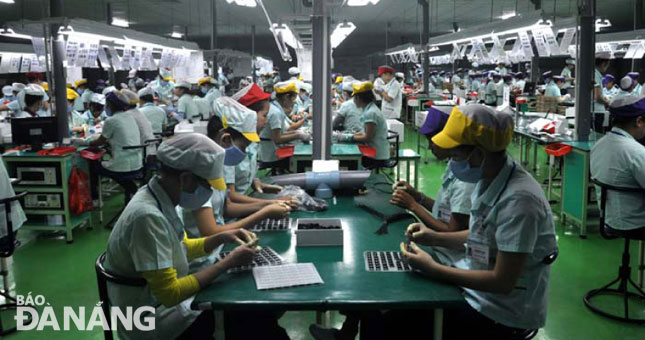Attracting more Japanese investment into city
According to the latest figures released by the Da Nang Department of Planning and Investment, Da Nang is now home to 153 Japanese-invested projects, totalling around 650 million USD. In addition, there are 2 Japanese ODA-funded projects in the city, namely the Hai Van Tunnel, and the 1st stage of the Tien Sa Port.
 |
| Workers at the Da Nang Foster Electric Company. |
Most of the projects have been operating effectively in the city, and their investors have obeyed the city’s regulations, and met their financial obligations.
In particular, such Japanese businesses are operating effectively in the city as the Route Inn Hotel, the Sun Frontier Real Estate Company, the Daiwa Company Limited, the Mabuchi Motor Company Limited, the Tokyo Keiki Company, and the Foster Electronics Company Limited.
However, according to a spokesperson for the representative office of Da Nang in Japan, the number of Japanese investors in the city is still lower that that in Ha Noi and Ho Chi Minh City.
Mr Nguyen Ky Anh, Deputy Director of the city’s Investment Support and Promotion Board, explained the reason is that Da Nang is a young city, recognised as a dynamic economic hub in the central region only 20 years ago. In addition, there are few non-stop flights between Da Nang and Japan.
He also remarked that the city is facing a severe shortage of qualified human resources and a critical lack of industrial premises. In addition, consumption in local market is not very effective. Moreover, there is a lack of employees who can speak Japanese fluently, so Vietnamese employees find it very hard to communicate with their Japanese experts.
Mr Nakata Takashi, Production Director of the Foster Electric Company Limited, stressed the need for the city to increase the supply of skilled employees, create even more favourable conditions for Japanese small and medium-sized enterprises, and clearly identify priority aspects in appealing for foreign investment, in a bid to make it more inviting to Japanese investors.
“The focus should be on advertising the city’s advantages to foreign investors, including its modern infrastructure, the favourable position of Da Nang International Airport being near the centre, and deep seaport. Heed should be paid to creating closer links with developed countries in order to train high-quality human resources for the city”, he added.
Deputy Director Anh highlighted the importance of accelerating the construction progress of the Lien Chieu Port, and such new industrial parks as Hoa Nhon, Hoa Lien and expanded Hoa Cam, in creating favourable conditions for businesses operating in industrial parks in the northwestern side of the city.
He also underlined the necessity of connecting with Japanese companies to train high-quality human resources. For example, the Framgia Company Limited and the municipal University of Science and Technology have jointly implemented training courses on IT engineers who can speak Japanese fluently.
In attempting to appeal for more Japanese investors to the city, since last year, the municipal authorities have focused on organising numerous investment promotion activities in foreign countries, especially Japan, and advertising the city’s images to international friends, including Japanese citizens.
Recently, the Authority of the local Hi-tech Park has granted the investment licence to the Yamato Sewing Machine Mfg Co Ltd which is a leading Japanese manufacturer of industrial sewing machines. The Japanese company is planning to build a factory in the Park to provide sewing machines, spare parts, accessories and automotive equipment in sewing industry, with a total of investment capital of 28.5 million USD.
Most recently, representatives of the Da Nang-based Long Hau Company and Japan’s Hatsuta Seisakusho Company have signed a 6,000m2 ready-built factory lease agreement.
Following the signing of the agreement between the two companies, the Japanese company will operate its over 2.6 million USD project on its leased industrial property.